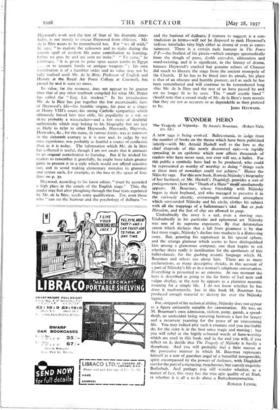WONDER HERO
A rtEw saga is being evolved. Balletomania, to judge from the number of books on the theme which have been published latterly—with Mr. Arnold Haskell well to the fore as the chief rhapsode of this newly discovered epic—is rapidly spreading in an epidemic which now affects thousands of readers who have never seen, nor ever will see, a ballet. For this public a symbolic hero had to be produced, who could be represented as worthy of worship as doing "things such as three men of nowadays could not achieve." Hence the Nijinsky saga. For this new book, Romola Nijinsky's biography of her husband, or Mr. Haskell's Diaghileff, provides a sort of prolegomenon ; here the "Death of a Here motif unashamedly appears. M. Bourman, whose friendship with Nijinsky began in their boyhood, and who managed to preserve it in the curiously electric, overwrought emotional atmosphere which surrounded Nijinsky and his circle, clothes his subject with all the trappings of a balletomane's idol. But ex pedo Herculem, and the feet of clay are allowed to peep.
Undoubtedly the story is a sad, even a moving one. Undoubtedly in his particular and ephemeral art Nijinsky was one of its supreme exponents. By that Aristotelian canon which declares that a fall from greatnes.s is by that fact more tragic, Nijinsky's decline into madness is a distressing story. But, granting his supremacy in his special sphere, and the strange glamour which seems to have distinguished him among a glamorous company, one then begins to ask whether there really is justification for the apotheosis of this ballet-dancer, for the gushing ecstatic language which M. Bournaan and others use about him. There are as many exclamations, as many descriptive shrieks, in this account of a part of Nijinsky's life as in a woman's telephone conversation. Everything is presented as an extreme. At one moment the hero is described as going to the far limits of bad taste and vulgar display, at the next he appears as a plaintive neurotic moaning for a simple life. I do not know whether he has done it inadvertently, but in this book M. Bourman has produced enough material to destroy for ever the Nijinsky legend.
For, stripped of his technical ability, Nijinsky does not appear as a figure eminently suitable for canonisation. He was, on M. Bourman's own admission, violent, petty, garish, a spend- thrift, an undecided being wavering between a lust for luxury and a recurrent yearning for the peace of an unassuming life. You may indeed pity such a creature and you inevitably do, for the story is in the best sense tragic and moving ; but you will rebel at the highly coloured words of hero-worship which are used in this book, and in the end you will, if you reflect on it, decide that The Tragedy of Nijinsky is hardly a theophany. And you will probably feel a faint nausea at the possessive manner in which M. Bourman represents himself as a sort of guardian angel of a beautiful irresponsible spirit encompassed by the powers of darkness, with Diaghileff cast for the part of a menacing, treacherous, but suavely exquisite Beelzebub.- And perhaps you Will -Wonder whether, as a matter of fact, this story has the true epic quality of an Iliad, or whether it is ail a to-do about a Battachotnyomachia.






































 Previous page
Previous page